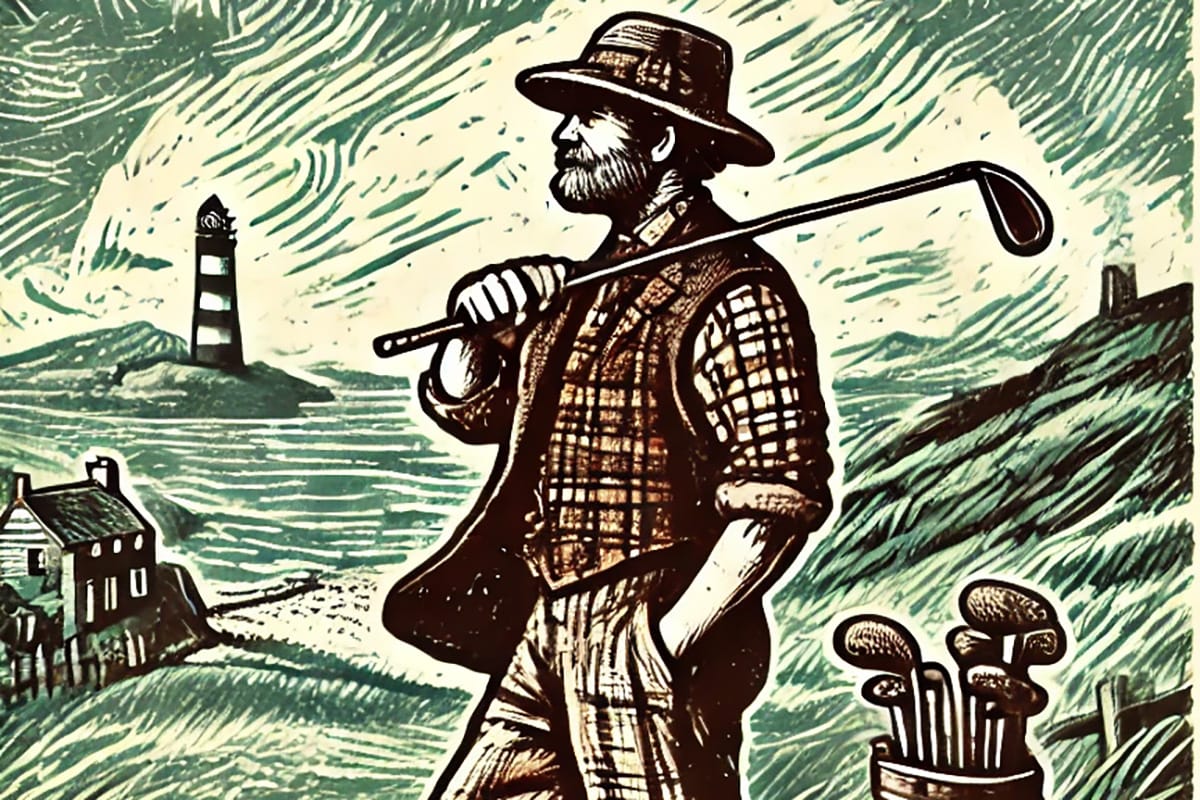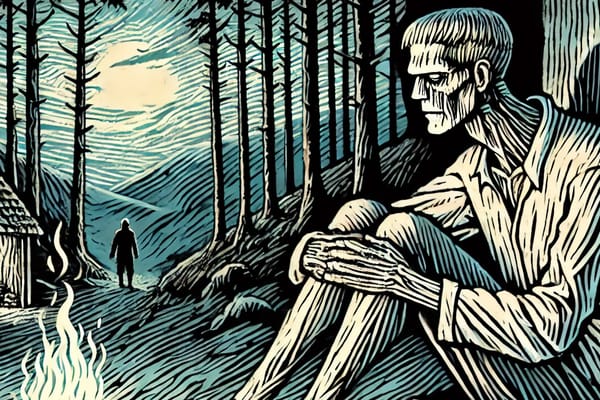Newsletter #2 - In the Game of Life, Take Your Swing

Welcome to this week's The Wild Gentleman newsletter.
Glad to have you here.
I want to take a moment to thank everyone who has supported this project thus far. Thank you from the bottom of my heart. I'm glad you like what I am putting out in the world enough to follow along for the ride by subscribing. To everyone who has joined as a paid subscriber, thank you for your patronage. I'll be sending you some cool things shortly.
If you are a subscriber, in addition to this newsletter, you also received the most recent blog post, which you can find here:
"Empathy is Now Controversial? What Would Atticus Finch Think" - I have been thinking a lot for the past couple days about a recent The New York Times piece on how "empathy became a threat." Reflecting on empathy, I think that encountering morally complex figures like Atticus Finch from To Kill a Mockingbird is a key to fueling our growth.
Read on to learn about the latest with The Wild Gentleman Book Club, how a pro athlete turned a press conference into a deep conversation about the essential things in life, and some of the best things we read this week.
Wild at Heart. Refined in Mind.
The Wild Gentleman Book Club
Things are starting to come together for The Wild Gentleman Book Club.
Our first in-person meetup will be happening at Paddy's Public House in the first week of August, and we will be discussing The Great Gatsby.
I am excited about getting the community element of The Wild Gentleman up and running. Bringing like-minded men together is crucial for all of us, and I'm excited to facilitate this unique gathering.
I've sent invites to a small group for the inaugural cohort, and I've also had folks reach out asking to be involved. For this first community meetup, I'm trying to keep the group small and will continue to add more gentlemen. If you are genuinely interested in joining the book club, please email me at dennis@thewildgentleman.com.
I haven't discussed much why we are reading The Great Gatsby first, but I think I was drawn to the idea of using a book that the younger versions of ourselves all probably read at some point, and to see how we see the themes related to life reflected in the story as older, more experienced men. Additionally, the book turns 100 years old this year, which is also noteworthy.
(If you want a copy, the book can be ordered at The Wild Gentleman bookshop).
I will be sending out notes before the inaugural meeting, and I'm trying to leverage Instagram messaging to communicate some real-time information about the Book Club.
(Follow The Wild Gentleman on Instagram if you don't already.)
To prepare a bit more, I also want to share a recent podcast episode of Kate and Charlie Gibson's The Book Case that features a discussion of The Great Gatsby and the themes inherent in the story that are important to engage with. You can listen to the Gatsby episode of The Book Case below.
Speech I'm Still Thinking About
As I write this newsletter, Day 3 of The 153rd Open Championship at Royal Portrush has concluded, and Scottie Scheffler is on top of the leaderboard.
If you are not aware, earlier in the week, Scheffler—the #1 ranked golfer in the world and the world's best golfer for the past three years—made news for a 5-minute-plus speech on Tuesday in Northern Ireland that has gone viral.
His talk (described as everything from a "sermon" to an "existential crisis") hit on some profound themes that usually don't pop up at a pre-tournament presser. Touching on everything from success, fulfillment, and what truly matters in life, it is one of the more striking and honest examinations I've ever heard from a professional athlete at the top of his game.
Scheffler starts by going deep into his emotional state, pretty honestly stating, "This is not a fulfilling life. It's fulfilling from the sense of accomplishment, but it's not fulfilling from a sense of like the deepest, you know, places of your heart."
You know, there's a lot of people that make it to what they thought was going to fulfill them in life, and then you get there and all of a sudden you get to number one in the world and they're like, "What's the point?" And, you know, I really do believe that because, you know, what is the point? You're like, "What? Why do I want to win this tournament so bad?" That's something that I wrestle with on a daily basis.
To hear this from an uber-successful athlete is shocking. But if you have ever wrestled with your successes and failures, I'm sure it resonates.
"I love the challenge. I love being able to play this game for a living. It's one of the greatest joys of my life," Scheffler continues. "But does it fill the deepest, you know, wants and desires of my heart? Absolutely not."
Some of the parts of the speech that really hit hard for me were Scheffler talking about the fleeting joys of winning. Multiple times, he references the great feeling of achieving a goal and enjoying that moment, but then, immediately, he moves on to the next challenge.
I think some people are uncomfortable with this monologue because it seems too familiar and commonplace. Scheffler is exploring the challenges we all face, often daily. We all experience these emotions and thoughts. How dare one of the world's most successful athletes be human.
I also really think there is a lot of meaning in his focus on family and being "present."
I have some dreams and aspirations that I'm always striving towards, but at the end of the day, I try to stay present...And I'm only going to be doing this for a finite amount of time. And so what works best for me is just to stay present, continue to put in the work, which I would argue is probably the most fun part for me. I love being able to practice and that's what I enjoy doing. And, you know, just trying to get the most out of myself each day.
What we have is an athlete contemplating the mortality of his career. It is refreshing, to my mind.
Good on you, Scottie.
The Gentleman Shares
I love to share the great reads I find, so I feel blessed to have this little newsletter space to pass on some writings that sparked ideas or made me think more deeply.
Here are some recent reads that I would love to share with you:
"Listen to 'Hamlet.' Feel Better" - by Jeremy McCarter, The New York Times.
I gained a lot of appreciation for Shakespeare during my teaching career, but mostly because it allowed me to take English classes through the Extension school at Harvard where I was able to experience the bard through the incredible lens of one of the best teachers I have ever had, Marjorie Garber.
"Hamlet" is so good. I did not appreciate it at all when I first read it as a senior in high school, but in my early thirties, I was enthralled.
This guest opinion piece in the Times by someone who has created an interesting audio version of the play is a good reminder of the timelessness of Shakespeare's ideas and characters. As Jeremy McCarter points out, "After the traumas of the past few years, Hamlet’s sorrow is likely to feel familiar, as is his sense of powerlessness...who among us hasn’t felt, as Hamlet does, that 'the time is out of joint'?"
Hamlet is a great character. And my perspective on him changed when it was revealed to me that the character's melancholy is a precursor to the dark, brooding leather jacket and indifferent cool of some of my favorite fictional characters and cultural figures: Fonzi, James Dean, Kerouac, Brando, Dylan, etc.
Don't believe me, is there anything more hipster-cool American than this:
Hamlet’s despair is so pervasive, and rendered so vividly by Shakespeare, that even people who have never seen the play or only dimly remember reading it in high school are familiar with the persona of the melancholy Dane: clad in black, moping around, unable to take action.
"Haruki Murakami and the Scarcity of Serious Thought"- by Cal Newport, CalNewport.com, Blog.
I have a growing appreciation for the work of Cal Newport, and I am also a big fan of Haruki Murakami, so this piece from a couple of years ago on calnewport.com caught my attention.
Newport recalls a section of Murakami's What I Talk About When I Talk About Running that breaks down the "scattered" approach Murakami had when writing his earlier novels (often after he closed down the Tokyo bar he owned and ran) and how he found his now revered style by moving to a small Japanese village to focus on his writing career.
Always a realist and a commenter against the current worship of "hustle culture," Newport nevertheless believes we can all commit to higher goals and more serious thinking.
Neither our economy nor the demands of a live well-lived dictate that everyone should aspire to be sitting alone at a desk in rural Narashino, crafting literature to the light of the rising sun. My growing concern, however, is that such real commitment to thought has become too rare.
Newport sees some of the traps in which we find ourselves in the young Murakami, "up late after closing the bar, frustrated that the metaphorical novels we’re crafting aren’t what they could be."
This resonates with me on several levels. I also worry, often, that I am stuck in a treadmill of nothingness that doesn't allow me to work towards the better, more creative version of myself.
I am working through that.
Upcoming...
Looking ahead: Our book club launches soon, and I'm excited to see what emerges when thoughtful men gather to explore ideas together. The conversation starts with Gatsby, but where it goes depends on all of us.
Until next week—keep reading, keep questioning, keep growing.




